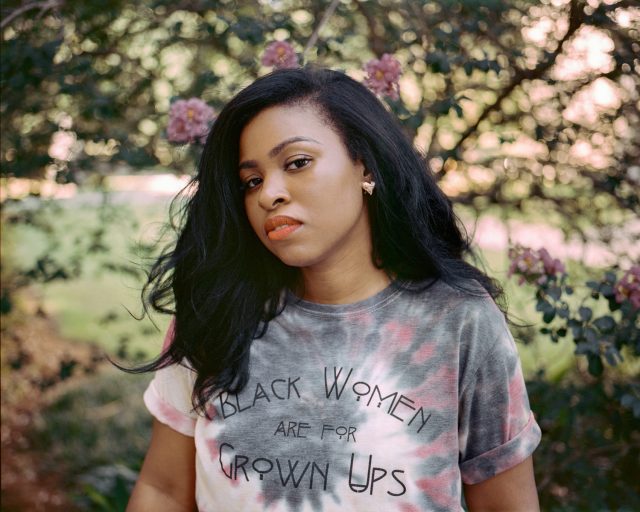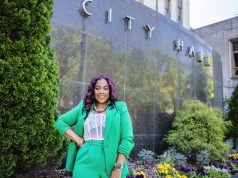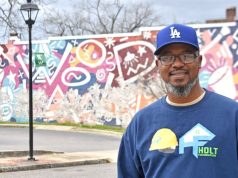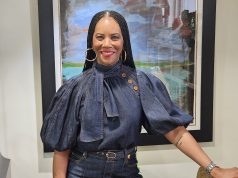By Ameera Steward
The Birmingham Times
Stevona Elem-Rogers grew up in Titusville and knows first-hand the history of a community that gave birth to former U.S. Secretary of State Condoleezza Rice; Birmingham civic leader Odessa Woolfolk and many other powerful Black women. Family members dating back to her great-great-grandmother were among some of the prominent citizens who walked the sidewalks for decades.
The 35-year-old Elem-Rogers used all of that wisdom to become a womanist writer, educator, orator, and advocate for Black culture and womanhood. In 2016, she launched Black Women Are For Grown Ups (BWAFGU), a digital campaign to celebrate the full and complex narratives of women.
“My [90-year-old] grandmother taught me what it means to be a grown up, what it means to accept responsibility for self, what it means to hold everybody else around me to the bar I set for myself,” said Elem-Rogers.
“The work I do is directly influenced by my grandmother, who is not afraid to share her story. She shares the down-and-dirty stuff, too, and I think that matters. … I actually think we would get a lot further, particularly Black women, if we just opened up. My grandmother has always, with me, been an open book about all the things she did right, didn’t do right, [and] would like me to do.”
There are many black women who are the same age as her grandmother and have the same type of wisdom to pass down to the younger generations, Elem-Rogers said, adding that every family has that person who tells the story of how Black women endured and overcame challenges.
Elem-Rogers, who lives in New Orleans, La., said her grandmother, from a country town called Letohatchee, Ala., became a nurse in the face of adversities like an abusive relationship and raising six children on her own. She remembers her grandmother saying, “‘The Black girl has never gotten a chance to really be a girl. We’ve always had to be at the forefront of our community, … and I want our men to step up. … We have some that do it and always have, but we need more. … [Black women] have always had to be the people who run it, who have to be the grown-ups, who have to make sure our communities are taken care of.’”
Another thing Elem-Rogers learned from her grandmother—how to do things for herself. Some good advice, for example: buy yourself flowers or have plants in your house.
“You need other living things in your house, you need other things that bring you joy,” Elem-Rogers said. “If you’re dating a man who buys you flowers and you never stop buying flowers for yourself, you’ll still have flowers if he leaves. That, to me, is beautiful.”
The “B” in Black
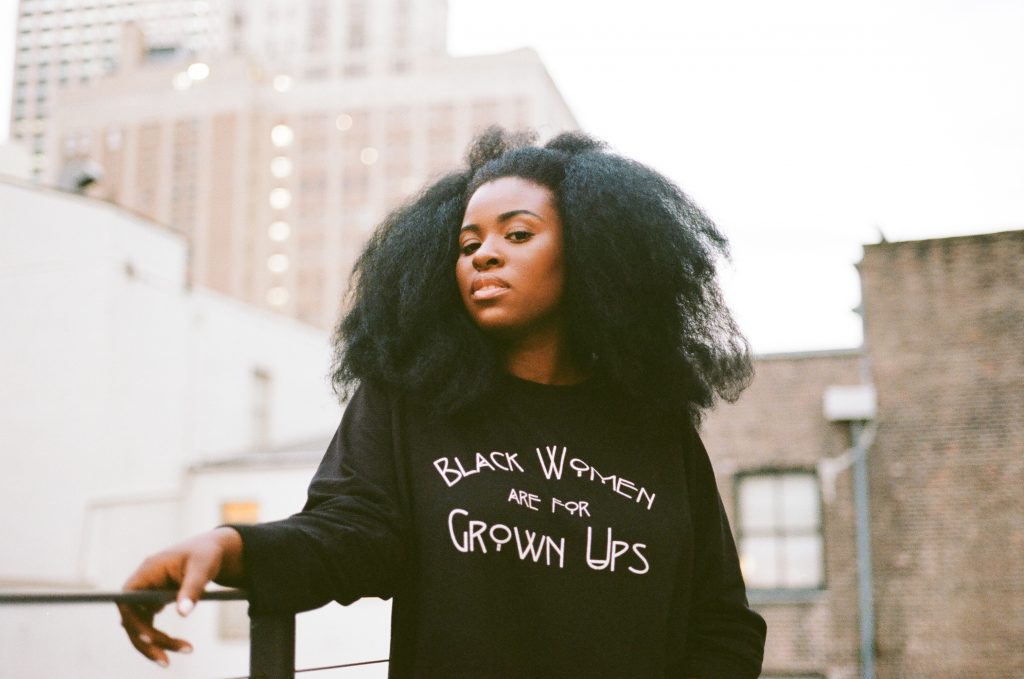
Just as important for her growth, Elem-Rogers said, are lessons she learned while growing up in Birmingham, especially being Black, because it gives a person “so much identity.”
“You know who you are, you know your people’s history … within your family but also within the greater collective. When I engage with people from other places, I find that they don’t always have that sense of self and sense of who we are,” she said. “There’s an elder I love, and she always says, ‘The ‘B’ in Black is capitalized because we’re a people; it’s not the color—we’re a nation. … I think you really feel that in Birmingham.”
Being raised in Birmingham gave Elem-Rogers a different perspective of the Civil Rights Movement.
From the outside, she said, people think, “You have Black people [who] are fighting for their rights and want the same things as white people.”
“What I got was how Black people come together and have self-reliance—how Black people come together as a collective and build a community among ourselves, how we look out for each other, how we help raise each other’s children. I always say I grew up on Center Place, and everybody on that street helped raised me. … Everyone really chipped in, and I think I became an educator and a writer because of that.”
Something to Say
Elem-Rogers attended Center Street Middle School on Center Street Way South. One of her teachers gave oratorical contests, during which the class would go to the library and recite a poem or monologue from memory.
“I would quote ‘Phenomenal Woman’ by Maya Angelou or ‘The Negro Speaks of Rivers’ by Langston Hughes, and it gave me such a pride,” she said. “[It] is always at the forefront of my thoughts that I was able to participate in these oratorical contests, saying words written by Black people—feeling them, learning them.”
“I [believe] that type of programming is what got me farther than, say, my math classes. [It taught me how to] to stand up, recite, articulate, read the crowd, know my audience—all the things I now do for a living.”
Elem-Rogers attended Birmingham’s John Carroll High School for two years, then her mother sent her to live with her father in Cleveland, Ohio, to finish high school. She attended at Shaker Heights High School, where she wrote a column on Black love for the school newspaper and authored her first play, which the school performed for a few years after she graduated in 2003.
Still, she always embraced her Birmingham roots.
“I come from that lineage,” Elem-Rogers said. “My aunts are those girls who were out there [during the Civil Rights Movement]. My mom was that girl who was sprayed with a hose. When I think about their extreme bravery, I realize that their bravery lives in me. I get to go out into the world and say that bravery lives in all Black people.”
Product of Her Environment
Elem-Rogers’s mother, Lois Elem Germany, is a former member of the Black Panther Party. Her father, Steven Rogers, was founder of Rogers Super Valu Foods supermarkets, a Cleveland, Ohio, grocery store chain that “took over abandoned supermarkets and made them profitable by providing good-quality food and services,” according to a June 1980 article in Black Enterprise magazine. Her mother is married to former Birmingham City Councilor and former Jefferson County Commissioner Jeff Germany. Her father is married to Shirley Rogers, a retired educator who taught for more than 30 years.
Elem-Roger’s mother didn’t allow her to watch television, which is how she became an avid reader.
“I would escape through books,” Elem-Rogers said. “I think that helped me become such a vivid learner and a vivid writer. … Even till this day, I still don’t really watch TV. … I don’t have a TV in my home; I have everything I need to create in my mind. I really don’t need the outside influence. Every now and again, I will see something that blows my mind away, but it’s rare.”
Elem-Rogers’s father had seven Super Valu stores and made his first million at the age of 22—“and he refused to move his grocery stores out of the hood,” she said.
“[My father] is literally my best friend,” she added. “He taught me a lot. He’s the reason I love jazz. He’s the reason I’m so into [jazz great John] Coltrane and have such a keen ear. He moved a lot of mountains on behalf of Black people, and I credit him with my eye and heart for Black people.”
Elem-Rogers added that she grew up hearing her father say, “Women are the center of the world. … Nothing moves without y’all. Y’all are the foundation of a nation.”
Sacred Work
In 2007, Elem-Rogers graduated from the University of Alabama with a Bachelor of Arts in English and African American studies. She embarked on her teaching career in New Orleans, La., by way of Teach For America, a nonprofit organization that finds leaders who commit to spending at least two years teaching in an under-resourced public school.
“For the last 13 years, I’ve lived in New Orleans, but it has operated as a second home for me since I was in my early teens,” she said. “Every year, my stepfather and my mother would bring me to the Essence Music Festival and the Bayou Classic, [the annual college football game between the Grambling State University Tigers and the Southern University Jaguars].”
Elem-Rogers now spends majority of her days as a writer. She also dedicates a lot of her time to Black Education for New Orleans, a community nonprofit she founded to provide direct support and narrative building to Black-governed and Black-led schools; she serves as director of program partnerships. Outside of that, she travels the world moderating panel events or giving keynote speeches.
In 2015, she earned a Master of Arts in Teaching (MAT) with a concentration in culturally responsive teaching, a pedagogical theory created and advanced by Black women scholars, from Louisiana College.
“I feel blessed that all my work is innovative and centers on the voices of Black people,” she added. “Being a Black woman writer is sacred work. I write in the tradition of [authors and activists] Nikki Giovanni, Alice Walker, and Sonia Sanchez, all of whom taught me that our lives are worthy of high regard and record.”
According to her website, Stevona.com, “In spring 2016, education became the foundation of BWAFGU, a digital campaign she launched alongside an ever-popular T-shirt to celebrate—and heighten the visibility of—the full, complex narratives of Black women.”
Said Elem-Rogers: “More than anything BWAFGU has opened my ears to literally thousands of stories from Black women. An earnest ear and a courageous pen are of the utmost importance to any writer, and I believe that advocating for Black women has sharpened both for me.”
Proceeds from Black Women Are For Grown Ups merchandise, such as T-shirts and the BWAFGU chapbook, allow Stevona Elem-Rogers to work with other Black creatives worldwide. To purchase merchandise and learn more about BWAFGU, visit Stevona.com.

